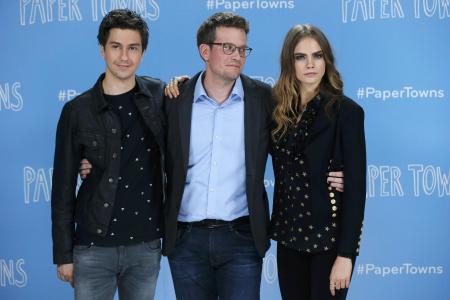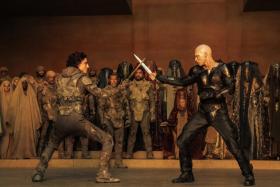John Green on his Paper Towns leading lady: 'Cara fascinates me'
US author John Green is no stranger to young adults who devoured his novels such as Looking For Alaska, Let It Snow: Three Romances, and The Fault In Our Stars.
The latter became a massive box-office hit when it was adapted for the big screen last year, turning its leads Shailene Woodley and Ansel Elgort into superstars.
History is repeating itself, as Green's latest film adaptation, Paper Towns, has put budding actors Nat Wolff and Cara Delevingne on the map.
Paper Towns, now showing in cinemas, is a funny and insightful coming of age story about Quentin aka Q (Wolff), a romantic and studious high school student, who is in love with Margo (Delevingne), his beautiful and enigmatic next-door neighbour.
When Margo mysteriously disappears after a wild, night-long adventure with Q, the lovesick Q and his friends set off on a road trip to track her down.
Here Green, 37, talks about teenagers, films, friendships and love.
What's Paper Towns all about?
It is about what happens when you dehumanise people by romanticising them. Q thinks that Margo is more than a person. He thinks that she is some kind of miracle and that turns out to be very destructive to him and to Margo and to their relationship.
It's also about how difficult it can be to understand that other people are really people who are just as complex as we are. To me it's a story about what love really is, not just romantic love but also the love between friends, which is an open acceptance of other people’s complexity.

Why was Cara Delevingne cast as Margo?
I don't know anything about supermodels to be honest with you, so when Cara auditioned for the role I didn't have any idea who she was. I didn't know she was famous.
But when she auditioned, she was the best person for the part. I didn't know this at the time, but I think one of the reasons that Cara is so good is that she understands what it's like to have people make broad conclusions about you based on very limited information.
The way people see Cara is very much the way Q sees Margo. Cara brought that knowledge to the way she played Margo and that's part of the reason why her performance is so memorable. She understands what it's like to have people treat you as a two-dimensional image, better than anyone I've ever met.
Also, Cara is an intense, fun person who has more charisma than anyone I've ever met. It's a bit of a mystery to me how charisma works, but she has it by the boatload, and she's a wonderful actress.
What is she like off the set?
Cara is loving and funny and complicated. She fascinates me. I love being her friend in no small part because I just love being in her presence. She's magnetic.
What does Nat Wolff bring to the role of Q?
He is one of my best friends so I'm biased!
Nat is so talented and such a good actor, but part of his genius is that he's also a welcoming and open person, so he makes everyone around him better.
He's always giving of himself and I absolutely think he's a leading man. I am so proud of Nat because he had a relatively small part in The Fault In Our Stars, but he was brilliant. He stole every scene that he was in.
I wanted him to be Q pretty much from the moment I met him. When we were on the set of The Fault In Our Stars, I started talking to him about Paper Towns. I told him that if it were ever made into a movie, I would really like him to play Quentin. Nat is great because he talks like people talk in my books. He seems like Quentin.

How exactly?
Quentin has moments of great confidence when he feels like he knows what he's doing, but he also has moments of great insecurity and Nat's able to chart all that really well.
I just knew he'd be great. He is a great actor and improviser and he responds really intelligently to direction.
The characters are so realistic. Do you think it is common to idealise love in Hollywood?
Yes there are a lot of stories about young men who romanticise young women as their reason for being.
If they can just get the girl, the story will end happily, whatever that means. Of course, that's not the way that human relationships work. It's not the way romantic relationships work. That's not the way boys and girls work.
In real life, that stuff is messy and complicated and in this film, we wanted to try to show how messy and complicated it can be. We wanted to show that the point of living is not necessarily to get the girl or the boy.

I wanted to write a story about a girl who's being mis-imagined and the boy who mis-imagines her and how that ends up hurting both of them. Their only real way forward is to learn to think about each other as people.
Margo teaches Q about living more in the present. Q teaches Margo about the pleasures of having some weight and groundedness in your life. But I also think that they make their own choices. There's not just one way to be an adult.
How do you manage to communicate with teenagers so well about complex subjects like philosophy and the meaning of life, but make it fantastically entertaining and fun?
Kids do talk about the meaning of life. They're not afraid to ask those big questions about whether there is meaning and order to human existence.
With Paper Towns I wanted to write a novel about the challenge of being stuck inside your own consciousness and not being able to live inside anyone else's mind and how difficult that is.
It inherently makes you less empathetic than maybe you ought to be. I also think that propels a lot of our worship of fame and our fascination with celebrity and renown; these arbitrary markers of success.
We believe that if we can just get attention from strangers; if our love affairs and our heartbreak were to appear on the covers of magazines, then people would know that our feelings are real.
I remember being in high school and breaking up with my girlfriend. For weeks on end I was talking to my friends about it all the time and at one point my best friend was like: "You know, dude, this is really annoying because your break-up is exactly like everyone else's break-up and you're acting like it's the most important thing that ever happened."
Source: Twentieth Century Fox
Get The New Paper on your phone with the free TNP app. Download from the Apple App Store or Google Play Store now


